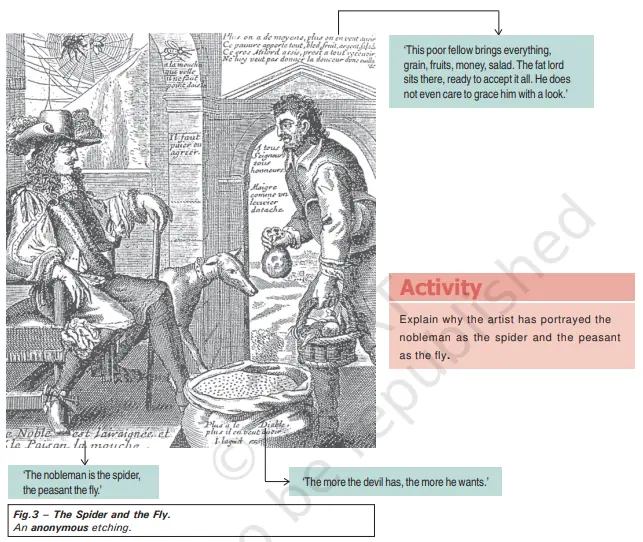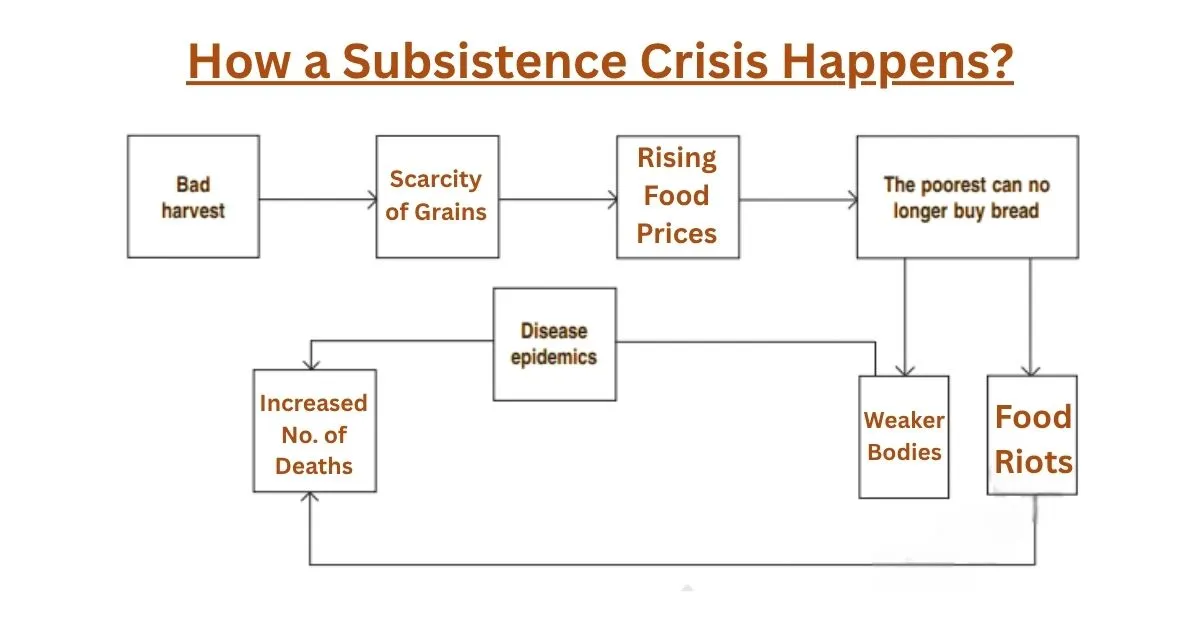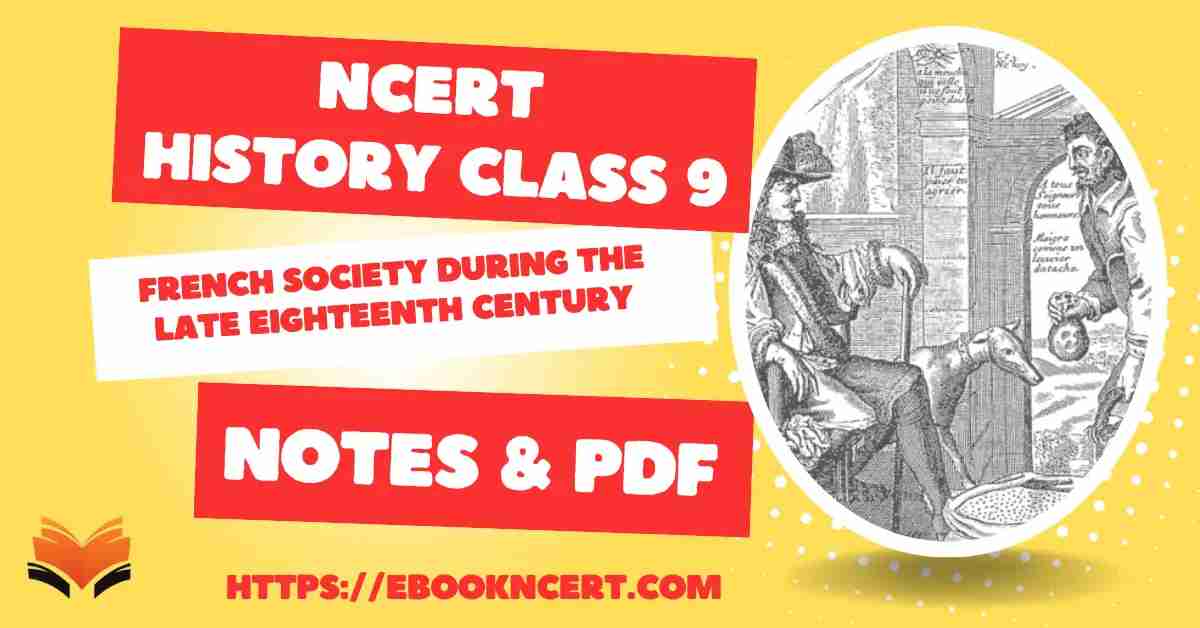French Society During the Late Eighteenth Century – Concept & Notes PDF
Topic & sub-topics covered: French Society During the Late Eighteenth Century and MCQs Questions: The French Revolution (All single detail notes are exam-oriented).
We have discussed in-depth and exam-oriented pointers that can be asked in the board exam of class 9th about the “French Society During the Late Eighteenth Century” from the NCERT History notes for class 9th chapter 1st “The French Revolution“.
Download the NCERT History for Class 9th Chapter 1 The French Revolution Notes PDF
NCERT History for Class 9th Chapter 1_ The French Revolution Notes & MCQ’s Question-Answer
Hey Class 9! The French Revolution chapter giving you a headache? Yeah, been there. So many names, dates, and those confusing terms like Estates General and Reign of Terror – it’s a lot, right?
When I first read this chapter, I honestly had no clue what was going on. Like… why were people storming a prison? Who even was Louis XVI? But once someone explained it in simple language, it finally clicked. That’s exactly why I made these notes – to help you get it without drowning in textbook blah-blah.
These notes are short, straight to the point, and written like a friend explaining stuff – not some robotic lecture. Whether you’re cramming before an exam (we’ve all done it) or just revising bit by bit, this French society during the late 18th century notes pdf got your back. And yep, it works offline too – because let’s face it, your Wi-Fi bails right when you need it most. Oh, and guess what? You can download it right below. Go on, grab it. No stress.
French Society During the Late Eighteenth Century

Louis XVI and the Financial Crisis
1. Accession of Louis XVI:
- Became King of France in 1774 at the age of 20.
- Belonged to the Bourbon family.
- Married to Marie Antoinette, Austrian princess.
2. Empty Treasury:
- Long wars and an extravagant court at Versailles drained France’s finances.
- France supported American colonies in their war of independence against Britain.
- This war added over 1 billion livres to the existing 2 billion livres debt.
3. Rising Interest Burden:
- Lenders charged 10% interest on loans.
- A large portion of the state budget went toward interest payments.
4. Taxation Measures:
- To manage expenses like the army and administration, the government increased taxes.
- But this still couldn’t meet the financial needs of the state.
Structure of French Society
1. Three Estates:
- French society in the 18th century was divided into three estates.
- Only the Third Estate paid taxes.
2. Old Regime:
- The term refers to the social and political system of France before 1789.
- It was part of the feudal structure that dated back to the Middle Ages.
3. Peasants and Land Ownership:
- Peasants formed 90% of the population.
- But very few owned land; about 60% of land was owned by nobles, clergy, and wealthy third estate members.
Privileges of the First and Second Estates
1. Tax Exemptions:
- Clergy and Nobility (First & Second Estates) were exempt from taxes.
- They enjoyed privileges by birth.
2. Feudal Privileges of Nobles:
- Could collect feudal dues from peasants.
- Peasants had to provide labor services, join the army, and help in road construction.
3. Taxes Collected by the Church:
- Collected a tax known as tithes from peasants.
Burden on the Third Estate
1. Direct and Indirect Taxes:
- Direct tax: Taille.
- Indirect taxes: On daily-use items like salt and tobacco.
2. Unequal Taxation:
- Only the Third Estate bore the burden of all state taxes.
By Reading Above topic “French society during the late eighteenth century Notes” you will be able to solve these question:
- Who was Louis XVI?
- What were the causes of financial crisis in France?
- Describe the structure of French society before 1789.
- What privileges did the first two estates enjoy?
- Why was the third estate burdened with taxes?
The Struggle to Survive:
Population Growth and Food Demand
1. Rapid Population Rise:
- France’s population grew from 23 million (1715) to 28 million (1789).
- This rise increased the demand for foodgrains, especially bread, the staple food.
2. Food Supply Crisis:
- Grain production failed to match the growing demand.
- Resulted in a sharp increase in bread prices.
Economic Hardship for the Poor
1. Wage Imbalance:
- Most workers were laborer’s in workshops.
- Their wages were fixed by workshop owners and did not rise with prices.
- This created economic disparity – the rich became richer, and the poor grew poorer.
2. Subsistence Crisis:
- Refers to a situation where basic needs (like food) are difficult to meet.
- Became common during the Old Regime in France.
- Worsened by natural calamities like droughts and hailstorms that damaged crops.
Key Concepts & Definitions
1. Subsistence Crisis (Define):
- A situation where food is insufficient to sustain life.
- Occurred frequently in pre-revolution France.
2. Bread as a Staple:
- Bread was the main food for the poor.
- Any rise in its price directly impacted their survival.
Cause of Revolution
1. Root of Discontent:
- Economic hardship due to rising prices and low wages was a major cause of the French Revolution.
By Reading Above topic “The Struggle to Survive” Notes you will be able to solve these question:
- What was the subsistence crisis?
- How did the rise in population affect French society?
- Why did the poor suffer more during the Old Regime?
- Explain the economic conditions of workers in 18th century France.
How a Subsistence Crisis Happens?

A Growing Middle Class Envisages an End to Privileges
1. Peasant and Worker Uprisings (Before Revolution):
- Peasants and workers had earlier revolted against high taxes and food scarcity.
- These revolts lacked organization and clear programmes to bring lasting social or economic change.
- Real transformation was led by prosperous and educated groups from the Third Estate.
2. Rise of the Middle Class (18th Century):
- The 18th century saw the rise of the middle class in France.
- They gained wealth from overseas trade and manufacturing (especially woollen and silk textiles).
- Key professions in this class included:
a. Merchants
b. Manufacturers
c. Lawyers
d. Administrative officials - These groups were educated and opposed privileges by birth.
3. Middle-Class Beliefs:
- They believed in a society based on:
a. Freedom
b. Equal laws
c. Opportunities for all - They rejected the idea that birth should determine privilege.
- Believed merit should decide a person’s social position.
4. Role of Enlightenment Thinkers:
- John Locke: In Two Treatises of Government, he rejected the divine and absolute right of kings.
- Jean Jacques Rousseau: Proposed a social contract between people and their representatives.
- Montesquieu: In The Spirit of the Laws, proposed a division of power among:
a. Legislature
b. Executive
c. Judiciary
5. Influence of American Revolution
- The USA implemented Montesquieu’s model after gaining independence from Britain.
- The American Constitution guaranteed individual rights, becoming a model for French thinkers.
6. Spread of Revolutionary Ideas
- Ideas of philosophers were spread through:
a. Salons
b. Coffee-houses
c. Books and newspapers - For illiterate people, books were read aloud in groups.
- The king’s plan to impose more taxes (due to rising expenses) caused public anger and protest.
- Privileged system became a major target of criticism.
By Reading Above topic “A Growing Middle Class Envisages an End to Privileges” you will be able to solve these question:
- Who formed the middle class in 18th-century France?
- What were Rousseau’s ideas on government?
- How did American independence inspire French thinkers?
- How were Enlightenment ideas spread among common people in France?
- What was the role of philosophers in the French Revolution?
Source A: Accounts of lived experiences in the Old Regime
1. Georges Danton’s Personal Experience (1793 Letter):
- Georges Danton was educated at the residential college of Plessis in France.
- He studied alongside important men, reflecting a privileged educational environment.
- After completing his studies, Danton struggled to find employment.
- Entry into the law courts was impossible without noble birth or connections.
- Career in the army was denied to him as he was not a noble.
- The Church did not provide him refuge or employment.
- He could not buy a government office because he did not have enough money (not even a “sou”).
- Lack of patronage and noble status limited his options despite being educated.
- Danton’s friends from elite circles abandoned him, exposing class-based exclusion.
- The system provided education without opportunities, especially for non-nobles.
- His experience highlights the injustice and rigidity of the Old Regime’s social hierarchy.
- Danton later became a revolutionary leader, shaped by these inequalities.
2. Arthur Young’s Observation (English Traveller: 1787–1789):
- Arthur Young, an Englishman, travelled across France between 1787 and 1789.
- He wrote detailed accounts of what he observed in French society.
- He criticized the French nobility for depending on ill-treated slaves for service.
- Young warned that exploiting people leads to danger and rebellion.
- He said, those who enjoy life while others suffer, should not be surprised by violent retaliation (e.g., kidnapping or murder during riots).
- His account suggests growing tensions between classes and the moral failure of the aristocracy.
- Arthur Young’s writings gave a foreign perspective on the cruelty and risk in French society before the Revolution.
New words:
- Livre – Unit of currency in France, discontinued in 1794
- Clergy – Group of persons invested with special functions in the church
- Tithe – A tax levied by the church, comprising one-tenth of the agricultural produce
- Taille – Tax to be paid directly to the state
- Subsistence crisis – An extreme situation where the basic means of livelihood are endangered
- Anonymous – One whose name remains unknown
Next & Previous Topics of NCERT/CBSE History Class 9 Chapter 1: The French Revolution
MCQs on NCERT History Class 9 Chapter 1 Topic – French Society During the Late Eighteenth Century
Here are the top exam-oriented MCQ-type questions on “French Society During the Late Eighteenth Century” that you should prepare for your CBSE or state board exams:
Question 1. Who ascended the throne of France in 1774?
a) Louis XV
b) Louis XVI
c) Napoleon Bonaparte
d) Charles X
Answer: b) Louis XVI
Question 2. Louis XVI belonged to which royal family?
a) Habsburg
b) Bourbon
c) Capetian
d) Romanov
Answer: b) Bourbon
Question 3. Who was Louis XVI married to?
a) Catherine the Great
b) Marie Antoinette
c) Elizabeth I
d) Isabella
Answer: b) Marie Antoinette
Question 4. Why was the French treasury empty when Louis XVI took over?
a) Economic boom
b) Long years of war and lavish court expenses
c) No taxation
d) Donation to the Church
Answer: b) Long years of war and lavish court expenses
Question 5. Which country did France help in gaining independence from Britain?
a) India
b) Thirteen American Colonies
c) Canada
d) Ireland
Answer: b) Thirteen American Colonies
Question 6. How much interest did lenders charge the French government?
a) 2%
b) 5%
c) 10%
d) 20%
Answer: c) 10%
Question 7. Who bore the burden of taxes in 18th-century France?
a) Nobility
b) Clergy
c) First and Second Estate
d) Third Estate
Answer: d) Third Estate
Question 8. What percentage of the population were peasants in France?
a) 50%
b) 60%
c) 90%
d) 75%
Answer: c) 90%
Question 9. Who were exempted from paying taxes in Old Regime France?
a) Nobles and Clergy
b) Only Nobles
c) Only Third Estate
d) All Estates paid equally
Answer: a) Nobles and Clergy
Question 10. What were the taxes collected by the Church called?
a) Taille
b) Livres
c) Tithes
d) Feudal Dues
Answer: c) Tithes
Question 11. What is taille?
a) A Church tax
b) A tax on imports
c) A direct tax paid to the state
d) A road-building fee
Answer: c) A direct tax paid to the state
Question 12. What term describes French society before 1789?
a) The Revolution Era
b) Old Regime
c) Ancient Times
d) Feudal France
Answer: b) Old Regime
Question 13. What caused food scarcity in 18th-century France?
a) Industrial growth
b) Falling population
c) Population growth without matching food production
d) Over-taxation
Answer: c) Population growth without matching food production
Question 14. What led to rising bread prices in France?
a) Cheap grain imports
b) Fall in demand
c) High grain production
d) Foodgrain shortage
Answer: d) Foodgrain shortage
Question 15. What is meant by ‘subsistence crisis’?
a) A war situation
b) A situation where basic means of livelihood are endangered
c) A financial crisis
d) A political crisis
Answer: b) A situation where basic means of livelihood are endangered
Question 16. Which class emerged due to expanding overseas trade and industry?
a) Peasant class
b) Noble class
c) Middle class
d) Clergy
Answer: c) Middle class
Question 17. Which professions were included in the Third Estate’s middle class?
a) Kings and nobles
b) Clergy and lords
c) Lawyers and administrative officials
d) Soldiers and knights
Answer: c) Lawyers and administrative officials
Question 18. Which of the following did NOT belong to the Third Estate?
a) Lawyers
b) Merchants
c) Nobles
d) Manufacturers
Answer: c) Nobles
Question 19. Who wrote Two Treatises of Government?
a) Rousseau
b) Montesquieu
c) Voltaire
d) John Locke
Answer: d) John Locke
Question 20. Which philosopher gave the idea of a ‘social contract’?
a) Montesquieu
b) Rousseau
c) Voltaire
d) Locke
Answer: b) Rousseau
Question 21. Who proposed the division of power into legislative, executive and judiciary?
a) Locke
b) Rousseau
c) Montesquieu
d) Diderot
Answer: c) Montesquieu
Question 22. Which country applied Montesquieu’s ideas in its constitution first?
a) France
b) USA
c) Britain
d) Italy
Answer: b) USA
Question 23. Where were the revolutionary ideas discussed and spread in France?
a) Palaces and churches
b) Newspapers and police stations
c) Salons and coffee houses
d) Factories and schools
Answer: c) Salons and coffee houses
Question 24. What problem did Georges Danton face after completing his studies?
a) Couldn’t find a job due to poor results
b) Was not supported by the Church
c) Was denied opportunities because he was not noble by birth
d) Refused to work in the army
Answer: c) Was denied opportunities because he was not noble by birth
Question 25. Why was Danton unable to join the army or buy a job position?
a) He was unfit physically
b) He was not a citizen
c) He lacked noble birth and money
d) He was too young
Answer: c) He lacked noble birth and money
Question 26. What does Arthur Young criticize in his account of France?
a) The monarchy’s laws
b) Poor condition of Paris
c) The ill-treatment of peasants and servants
d) The role of Church in education
Answer: c) The ill-treatment of peasants and servants
Question 27. What fear did Arthur Young express regarding slave-like treatment?
a) It would reduce taxes
b) It would weaken the monarchy
c) It would lead to revolts and violence
d) It would increase prices
Answer: c) It would lead to revolts and violence

